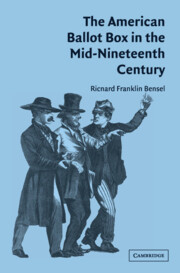Book contents
- Frontmatter
- Contents
- Preface
- Chapter 1 Introduction
- Chapter 2 Structure and Practice of Elections
- Chapter 3 Social Construction of Identity in Eastern Rural Communities
- Chapter 4 Ethno-Cultural Stereotypes and Voting in Large Cities
- Chapter 5 Frontier Democracy
- Chapter 6 Loyalty Oaths, Troops, and Elections during the Civil War
- Chapter 7 Conclusion
- Index
Chapter 4 - Ethno-Cultural Stereotypes and Voting in Large Cities
Published online by Cambridge University Press: 10 November 2009
- Frontmatter
- Contents
- Preface
- Chapter 1 Introduction
- Chapter 2 Structure and Practice of Elections
- Chapter 3 Social Construction of Identity in Eastern Rural Communities
- Chapter 4 Ethno-Cultural Stereotypes and Voting in Large Cities
- Chapter 5 Frontier Democracy
- Chapter 6 Loyalty Oaths, Troops, and Elections during the Civil War
- Chapter 7 Conclusion
- Index
Summary
In terms of political practice and material organization, rural precincts in long-settled regions of the slave and free states had more in common with each other than either had with polling places in large cities. And large cities, whether northern or southern, resembled one another more than either looked like their immediately surrounding rural areas. This general divergence between rural and urban polling places arose for a number of reasons. For one thing, urban populations were much more diverse in terms of ethnicity, religious beliefs, and economic livelihoods than were their rural hinterlands. This diversity, along with the emergence of ghettos that concentrated urban inhabitants in their own distinct ethnic, religious, and class communities, meant that party agents and election officials did not personally know many of the men who approached the voting window. And even if one of them might recognize a man, the others usually could not help to establish that voter's identity.
In addition, polling places in the nation's largest cities were much closer together than they were in rural neighborhoods. In rural areas, polling places were usually at least several miles apart, and riding from one to the other was inconvenient at best. But in the largest cities polling places might be only blocks apart, with one close to where a man lived, another near the place in which he worked, and perhaps yet another somewhere along the path he normally took between home and work. The close proximity of polling places in larger cities, combined with the relative anonymity of individuals, meant that men could choose the precinct in which they might vote without going too far out of their way.
- Type
- Chapter
- Information
- The American Ballot Box in the Mid-Nineteenth Century , pp. 138 - 186Publisher: Cambridge University PressPrint publication year: 2004
- 1
- Cited by



